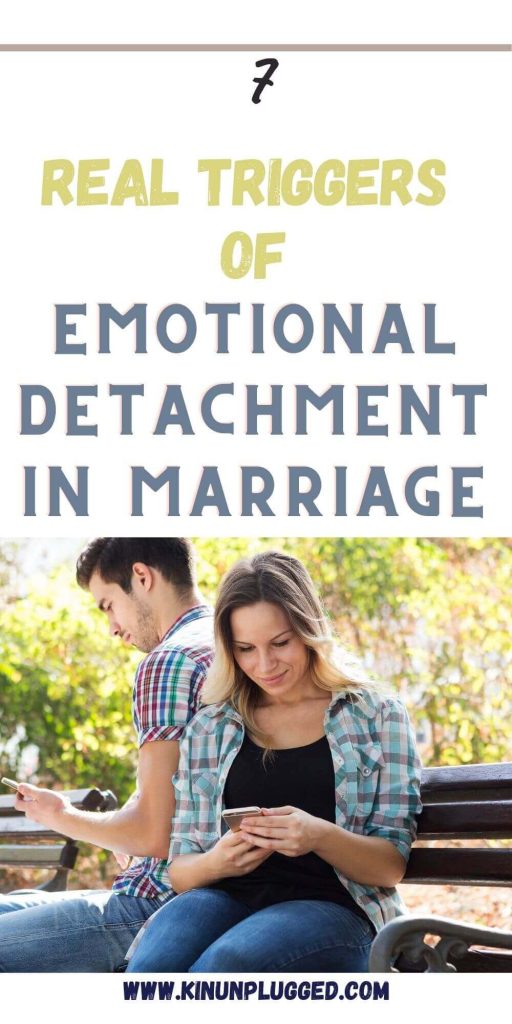If you are wondering how to practice emotional detachment in marriage, you have probably reached the end of your thread in your marriage. You have reached the end of your patience thread when it comes to enduring different kinds of emotional heartbreak in your marriage and you think you need to protect your heart while remaining in the marriage.
In order to become an emotionally detached wife or husband, it is important to focus your passions and energies elsewhere or with other people apart from your spouse. Sure, you might think this is easier said than done when you live with your spouse. This article will give you useful tips on how to emotionally detach from your spouse whether you are under the same roof or not.

First, what causes someone to become emotionally detached in their marriage?
What triggers emotional detachment?
The following points are some of the reasons why emotional detachment in relationships occurs. While this list is not exhaustive, you will find that one or more of these is more often than not the cause of a person emotionally detaching from their spouse.
- Past trauma or abuse. When past trauma or abuse is not dealt with in a positive way, a person may instead build emotional walls to prevent themselves from getting hurt again. These walls can result in emotional detachment in relationships. The emotional detachment becomes a crutch or a coping mechanism.
- Mental disorders. There are some mental illnesses that involve emotional detachment as a symptom. It is possible that an emotionally detached wife, for example, is behaving the way she is because she is experiencing a specific type of mental illness.
- Inability to express emotion. Some people just naturally find it harder to express their emotions than other people do. They may just find it easier to shut themselves off than to be vulnerable with others.
- Medication. Much like mental illness can lead to emotional detachment, some medications can also cause emotional detachment. Emotional detachment in marriage can be triggered by certain types of antidepressants, for example.
- Lack of empathy. When one spouse is mentally unable to put themselves in the place of the other, they may resort to emotionally shutting down instead because they simply cannot understand their spouse.
RELATED: A lack of empathy in marriage
- Upbringing/childhood. Where one spouse did not grow up being shown much affection or did not experience much emotion from the people around them, it will be difficult for them to show any emotion towards others.
- Necessity. Sometimes, in marriage, emotional detachment can become necessary. It can become necessary to protect your heart and mind from frequent torture or abuse. Mainly when you cannot immediately abandon a toxic marriage. This can even be the case when your spouse is not toxic but simply not right for you and you still care for your spouse. In this case, compassionate detachment in marriage may be required.

How do you lovingly detach within your marriage?
It is one thing to guess how to emotionally detach in marriage but a little more complicated to figure out how to practice emotional detachment in marriage in a loving manner.
Here are some steps to take:
1. Do not give advice unless it is asked for.
There is no need to insert yourself into situations or offer advice to your spouse unless it is absolutely necessary. For example, in a life or death situation.
2. Express your feelings but sparingly
Make sure you let your spouse know exactly how you feel but try to do so in a few words and not too often.
3. Understand that your feelings are real and valid
Be easy enough on yourself to acknowledge and validate your own emotions. You have real reasons for needing to become emotionally detached.
4. Set boundaries.
Yes, there is the emotional boundary around your heart that you are setting up. There will most likely be other boundaries that you need to set up as well in order to be successful in practicing emotional detachment in your marriage. There may be some physical or sexual and financial boundaries, for example, that you should consider setting up as well. If you are considering emotional detachment, your sex life is unlikely to be what it used to be anyway. Without any emotional intimacy, the chance of any qualitative physical intimacy is low.
5. Keep a journal
A journal will be a vital outlet for you. You need some other way of letting out your emotions than to your spouse. Practicing emotional detachment in marriage means that you are no longer able to express yourself to your spouse and you may find that you are initially constantly trying to stop yourself from sharing one thing or the other with them. A journal is a good way to vent and write down thoughts and feelings that you can no longer share with your spouse.
READ: The benefits of journaling

6. Expect nothing
Let go of any expectation of your spouse. Do not expect them to change, to hear you out, to understand you or to empathise.
7. Meditate
These times will be trying for you. Particularly initially, it might be extremely difficult for you to detach without being mean to your spouse. Meditation will help to centre you and bring you some peace.
8. Be respectful
Maintain a level of respect for your spouse as a human being even if you cannot find any respect for them as a life partner.
9. Focus on the now
Stressing yourself out about the future or feeling anger, shame or sadness about the past is unhealthy.
10. Find a hobby or hobbies
You need to find areas in life where you can channel your passions. Do more of the things you love.
11. Go back to your roots
Intentionally emotionally detaching in marriage unfortunately means you will be acting out a role that you did not intend to. You will be doing your best, at least initially, to ignore any feelings you have for your spouse. This means ignoring a part of yourself.
You therefore have to try even harder to be yourself in as many other aspects of your life as possible. Spend time with close friends and family and the people who know you best so that you do not lose yourself altogether.
Once you follow all or some of the steps above and are able to achieve emotional detachment, you will be able to enjoy the benefits of practicing detachment in marriage.

The benefits of emotional detachment in an unhappy marriage
- Emotional freedom and independence. When you emotionally detach, you are in better control of your emotions. You are therefore also in better control of your reactions to negative situations. In addition, you gain independence because you are not relying on your spouse for any emotional support.
- Resilience. In becoming more independent and knowing you cannot rely on your spouse anymore, you then also become resilient. You know that you have to be strong in order to survive and particularly if you have kids, you have to be strong for them as well.
- Personal time. You have more time to yourself to do with as you wish because you are no longer obliged to spend time with your spouse.
- Individuality. You spend more time on your own and therefore have more time to develop your own sense of individuality. This could mean positive changes to your personal style, for example. It could also mean rediscovering things about yourself that you loved but abandoned when you got married.
- Realism. Since you are now solely in charge of your wellbeing, you are forced to become more practical and more pragmatic. You have a sense of realism about what you can do for yourself and for your family.
It is true that you can gain all these benefits from achieving emotional detachment in marriage. However it is also important to remember that emotional detachment might not end up feeling as satisfying as you expect it to.

The disadvantages of emotional detachment in marriage
Emotional detachment in relationships, compassionate or not, can feel uncomfortable and lead to other issues. For example:
- Likelihood of eventual divorce is high. A predictor of divorce is emotional withdrawal from your spouse.
- Resentment can develop on your partner’s end. Whether you detach in a loving manner or not, your spouse could still experience feelings of abandonment and they could become resentful towards you.
- Boredom. Emotional disconnection involves spending less time with your spouse while still living with them. Even if you have hobbies to take up some of your time, you could still be bored at home because you cannot have fun with your spouse.
- Loneliness. Just as easily as you can get bored within your family set up, being emotionally detached can also be lonely.
- Anxiety and depression. It takes a lot of emotional energy and suppression of emotions to detach from someone you love so much. Emotional disconnection can lead to feelings of anxiety and depression because you have to suppress your feelings. When your feelings do not have an outlet, that can sometimes lead to anxiety and depression.
Are you in a marriage that is forcing you to consider emotionally detaching?
READ
The most important things to talk about before marriage
Reassurance after Cheating: Rebuilding Marriage after Infidelity
The most important things to talk about before marriage








4 Comments
I have definitely experienced this and it’s important not to loose yourself. These are great tips! Thank you
Thank you, this article helped me understand myself better and my need for detachment!
So glad you found it useful
Thank You, i really, really needed this. I am not alone…